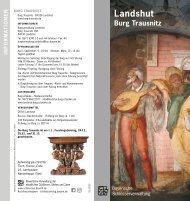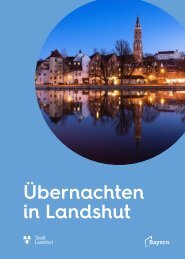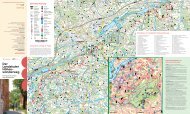Hohe Tauern Blicke 2022
NATIONALPARK HOHE TAUERN NATIONALPARK HOHE TAUERN Als bereits im Jahr 1872 der weltweit erste Nationalpark – der Yellowstone Nationalpark im Norden der Vereinigten Staaten errichtet wurde – ahnte wohl noch niemand, dass dies der Grundstein für tausende weitere Nationalparks in der ganzen der Welt sein 4 würde, so auch für den Nationalpark Hohe Tauern. Im Jahr 1913 ergriff der Landtags- abgeordnete Dr. August Prinzinger die Ini- tiative und der Verein Naturschutzpark kauf- te rund 1100 ha Grund im Amertal und im Stubachtal an, um es speziell zu schützen. 1971 beschlossen dann die drei Landes- hauptleute von Salzburg, Kärnten und Tirol durch die Unterzeichnung der Dreiländer- Vereinbarung in Heiligenblut die Errich- tung eines Nationalparks. Die Umsetzung dauerte unterschiedlich lange in den einzelnen Ländern und mehrere Etappen galt es zu überwinden. In den 1980er Jahren wurde der Nationalpark Hohe Tauern als erster und größter Nationalpark in Österreich errichtet und seither wurde stets an diesem Projekt weitergearbeitet. When the world’s first national park – Yel- lowstone National Park, in the northwest- ern United States – was established back in 1872, nobody would ever have imagined it would be the foundation stone for thou- sands of other national parks around the globe, National Park Hohe Tauern amongst them. In 1913, provincial legislator Dr. Au- gust Prinzinger took the initiative and fol- lowing the Nature Sanctuary Association bought up roughly 1100 ha in Amertal and Stubachtal in order to put that land under special protection. In 1971, the three provincial governors of Salzburg, Carinthia and Tyrol signed the Three Provinces Agreement in Heiligen- blut, thereby committing themselves to creating a national park. The actual im- plementation period varied in length f rom province to province and took place in several stages. In the 1980s, National Park Hohe Tauern finally opened, Austria’s first and largest national park, since when this project has continued to evolve.
NATIONALPARK HOHE TAUERN NATIONALPARK HOHE TAUERN
Als bereits im Jahr 1872 der weltweit erste Nationalpark – der Yellowstone Nationalpark im Norden der Vereinigten Staaten errichtet wurde – ahnte wohl noch niemand, dass dies der Grundstein für tausende weitere Nationalparks in der ganzen der Welt sein
4 würde, so auch für den Nationalpark Hohe Tauern. Im Jahr 1913 ergriff der Landtags- abgeordnete Dr. August Prinzinger die Ini- tiative und der Verein Naturschutzpark kauf- te rund 1100 ha Grund im Amertal und im Stubachtal an, um es speziell zu schützen.
1971 beschlossen dann die drei Landes- hauptleute von Salzburg, Kärnten und Tirol durch die Unterzeichnung der Dreiländer- Vereinbarung in Heiligenblut die Errich- tung eines Nationalparks. Die Umsetzung dauerte unterschiedlich lange in den einzelnen Ländern und mehrere Etappen galt es zu überwinden. In den 1980er Jahren wurde der Nationalpark Hohe Tauern als erster und größter Nationalpark in Österreich errichtet und seither wurde stets an diesem Projekt weitergearbeitet.
When the world’s first national park – Yel- lowstone National Park, in the northwest- ern United States – was established back in 1872, nobody would ever have imagined it would be the foundation stone for thou- sands of other national parks around the globe, National Park Hohe Tauern amongst them. In 1913, provincial legislator Dr. Au- gust Prinzinger took the initiative and fol- lowing the Nature Sanctuary Association bought up roughly 1100 ha in Amertal and Stubachtal in order to put that land under special protection.
In 1971, the three provincial governors of Salzburg, Carinthia and Tyrol signed the Three Provinces Agreement in Heiligen- blut, thereby committing themselves to creating a national park. The actual im- plementation period varied in length f rom province to province and took place in several stages. In the 1980s, National Park Hohe Tauern finally opened, Austria’s first and largest national park, since when this project has continued to evolve.
Create successful ePaper yourself
Turn your PDF publications into a flip-book with our unique Google optimized e-Paper software.
HOHETAUERNBLICKE<br />
WEITWANDERN<br />
Der „<strong>Hohe</strong> <strong>Tauern</strong> Panorama Trail“ führt auf<br />
270 Kilometern quer durch die Nationalparkregion.<br />
Ab Sommer <strong>2022</strong> ist der "<strong>Hohe</strong> <strong>Tauern</strong><br />
Panorama Trail" ein Weitwander-Erlebnis<br />
der Extraklasse in der Ferienregion Nationalpark<br />
<strong>Hohe</strong> <strong>Tauern</strong>. Im Rahmen von<br />
17 Tagesetappen legen Wanderer vom<br />
Startpunkt am Fuße der Krimmler Wasserfälle<br />
bis ins Tal der Almen nach Hüttschlag<br />
im Großarltal 270 Kilometer und<br />
14.000 Höhenmeter zurück. Übernachtet<br />
wird wechselweise im Tal oder auf den Bergen.<br />
Der Trail führt quer durch die Nationalparkregion<br />
<strong>Hohe</strong> <strong>Tauern</strong> und eröffnet atemberaubende<br />
Ausblicke auf die höchsten<br />
Berge Österreichs. Die Nutzung von Bergbahnen<br />
oder praktischen Shuttle-Diensten<br />
an den Etappenzielen sowie ein buchbarer<br />
Gepäcktransfer bieten höchsten Komfort.<br />
Auf dem Weg liegen Naturschauspiele, sehenswerte<br />
Ausstellungen, gepflegte Nationalpark-Orte<br />
und attraktive Ausflugsziele.<br />
Ein Wander-Erlebnis,<br />
das nachhaltig<br />
Eindruck hinterlässt<br />
Im größten Naturschutzgebiet Zentraleuropas<br />
gilt es ein fantastisches Stückchen<br />
Erde zu entdecken, das in seiner Vielfalt und<br />
Unberührtheit seinesgleichen sucht und<br />
in dem die bewegte Geschichte allgegenwärtig<br />
ist. Diese Region zu Fuß, aus eigener<br />
Kraft und mit kleinem ökologischen Fußabdruck<br />
zu entdecken, ist ein Natur- und Wandererlebnis<br />
der besonderen Art. Der „<strong>Hohe</strong><br />
<strong>Tauern</strong> Panorama Trail“ macht genau das<br />
möglich. Bestens beschildert führt er vom<br />
Die größten Wasserfälle Europas, uralte<br />
Gletscher und sagenumwobene Handelswege.<br />
Bartgeier, Murmeltiere und Gämsen,<br />
die Historie des Goldabbaus und ein<br />
einzigartiges Smaragdvorkommen. Die<br />
mächtigsten Berge Österreichs, Klammen,<br />
echte Urwälder und ein international anerkanntes<br />
Wildnisgebiet: Die Natur spielt<br />
im Nationalpark <strong>Hohe</strong> <strong>Tauern</strong> alle Stücke<br />
und ein Superlativ reiht sich an das nächste.<br />
Doch auch von Menschenhand Geschaffenes<br />
liegt auf dem „<strong>Hohe</strong> <strong>Tauern</strong> Panorama<br />
Trail“ und macht diesen nicht nur aufregend<br />
schön, sondern auch aufregend spannend<br />
und informativ: malerische Orte, seit<br />
Generationen bewirtschaftete Almhütten,<br />
weltberühmte Orte der Sommerfrische,<br />
Wallfahrtsstätten und steinerne Zeitzeugen<br />
der Geschichte sowie spektakuläre Ausflugsziele<br />
zählen dazu.<br />
westlichsten Teil des Bundeslandes Salzburg<br />
auf der nördlichen Seite des Salzachtals<br />
bis nach Zell am See und von dort immer<br />
weiter ostwärts über Raurisertal und<br />
Gasteinertal bis ins Großarltal. Die gesamte<br />
Strecke von 270 Kilometern ist für 17 Etappen<br />
ausgelegt. Pro Tag sind Weitwanderer<br />
zwischen vier bis acht Gehstunden – ohne<br />
Seilversicherung und in einer Aussichtslage<br />
zwischen 1.500 bis 2.400 Meter Seehöhe –<br />
unterwegs. Sollten in den Nebensaisonen<br />
witterungsbedingt – etwa durch Schnee in<br />
den Höhenlagen – die Hauptrouten noch<br />
nicht begangen werden können, stehen<br />
Wanderern Alternativrouten zur Verfügung.<br />
www.hohetauerntrail.at<br />
The 270-kilometre <strong>Hohe</strong> <strong>Tauern</strong> Panorama Trail<br />
takes you right through the National Park region.<br />
From summer <strong>2022</strong>, the <strong>Hohe</strong> <strong>Tauern</strong> Panorama<br />
Trail in the <strong>Hohe</strong> <strong>Tauern</strong> National<br />
Park holiday region will be a long-distance<br />
hiking experience that's in a class of its<br />
own. Over the course of 17 one-day stages,<br />
hikers cover a distance of 270 kilometres<br />
and 14,000 metres altitude from the starting<br />
point at the foot of the Krimmler Waterfalls<br />
to Hüttschlag in the Großarltal valley,<br />
also called the "Tal der Almen", or the valley<br />
of the Alpine inns. Overnight accommodation<br />
alternates between the valley and the<br />
mountains. The trail takes hikers through<br />
the <strong>Hohe</strong> <strong>Tauern</strong> National Park region,<br />
affording breathtaking views of Austria's<br />
highest mountains. The mountain railways<br />
and handy shuttle services at the stage<br />
destinations as well as optional luggage<br />
transfer offer maximum comfort. En route<br />
you will find stunning natural attractions,<br />
great exhibitions, well-kept national parks<br />
and attractive excursion destinations.<br />
The highest waterfalls in Europe, ancient<br />
glaciers and legendary trade routes.<br />
Bearded vultures, marmots and chamois,<br />
the history of gold mining and unique emerald<br />
deposits. Austria's mightiest mountains,<br />
ravines, truly primeval forests and<br />
an internationally recognised wilderness<br />
reserve: At the <strong>Hohe</strong> <strong>Tauern</strong> National Park,<br />
nature rolls out one superlative after another.<br />
But the picturesque <strong>Hohe</strong> <strong>Tauern</strong><br />
Panorama Trail also offers plenty of exciting<br />
and informative man-made wonders:<br />
charming towns and villages, Alpine farms<br />
passed down through the generations,<br />
world-famous summer resorts, places of<br />
pilgrimage, stony witnesses to history as<br />
well as spectacular tourist destinations.<br />
A hiking experience<br />
that leaves a<br />
lasting impression<br />
The largest nature reserve in Central Europe<br />
is a stunning part of the world that is<br />
more diverse and pristine that almost anywhere<br />
else - a place with a chequered history<br />
that's all around you. Discovering this<br />
region on foot, under your own steam and<br />
with a small ecological footprint is a fabulous<br />
nature and hiking experience. That's<br />
what the <strong>Hohe</strong> <strong>Tauern</strong> Panorama Trail is<br />
all about. The trail is well signposted and<br />
takes you from the westernmost tip of the<br />
province of Salzburg on the northern side<br />
of the Salzachtal valley to Zell am See and<br />
from there eastwards via the Raurisertal<br />
and Gasteinertal valleys and all the way<br />
to the Großarltal valley. The 270-kilometre<br />
route is perfect for 17 stages. Each day the<br />
long-distance hikers walk for four to eight<br />
hours – without rope and between 1,500<br />
and 2,400 metres above sea level, affording<br />
panoramic views. Alternative routes<br />
are available if the main routes cannot be<br />
accessed during low season due to bad<br />
weather, such as snow at high altitudes.<br />
www.hohetauerntrail.at<br />
HOHETAUERNBLICKE<br />
9<br />
WEITWANDERN

















